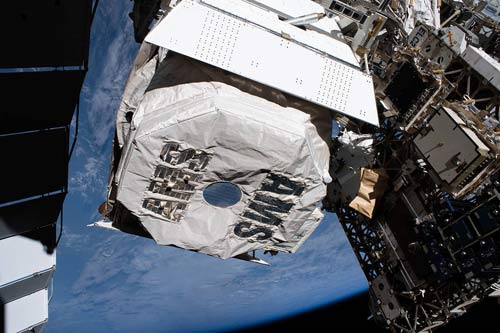Alpha Magnetic Spectrometer

The Alpha Magnetic Spectrometer 02, an antimatter and dark matter detector, is wrapped in shielding labeled with the research device's acronym, AMS. Astronauts Andrew Morgan and Luca Parmitano worked over a series four spacewalks beginning in November 2019 to upgrade and restore the AMS thermal systems to ensure the astrophysics device continues science operations for years to come.
Alpha Magnetic Spectrometer (AMS) is an experiment flown on the Space Shuttle and the International Space Station (ISS) to search for dark matter, missing matter, and antimatter in space. It uses a variety of instruments to detect particles and measure their electric charge, velocity, momentum, and total energy. Particle physicists hope that its results will shed light on such topics as the Big Bang, the future of the universe, and the nature of dark matter that make up most of the mass of the cosmos.
AMS-01 flew on Shuttle mission STS-91 in May 1998. AMS-02 was one of the first experiments to be fixed to the outside of the ISS in May 2011. AMS-02 has collected and analyzed billions of cosmic ray events, and identified 9 million of these as electrons or positrons. Researchers also observed a plateau in the positron growth curve and need additional data to determine why. Results suggest that high-energy positrons and cosmic ray electrons may come from different and mysterious sources.


